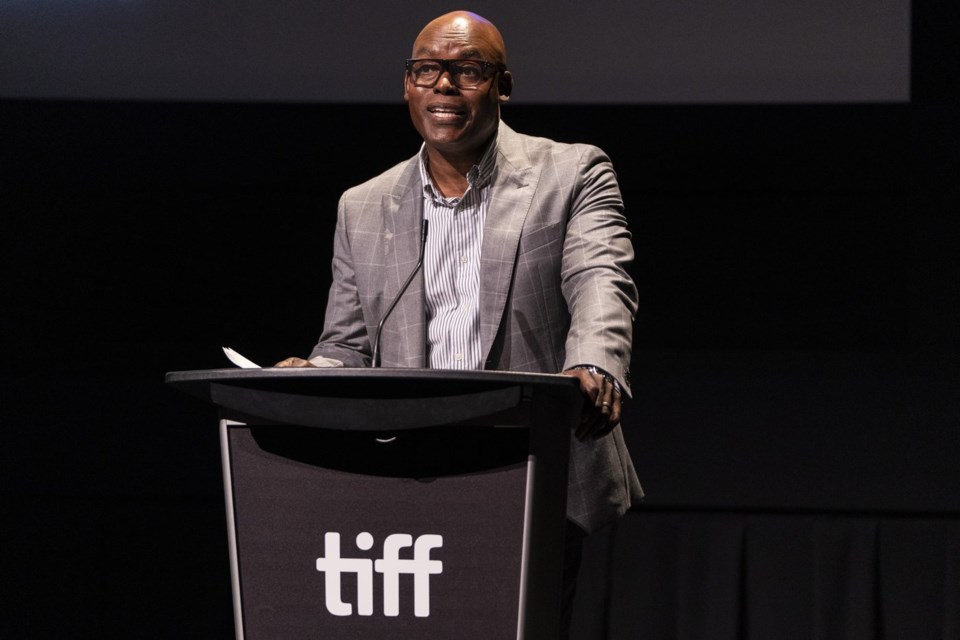TORONTO — The head of the Toronto International Film Festival says he isn’t panicking over U.S. President Donald Trump’s film tariff threat — in part because he says Canada plays a key role in Hollywood’s global dominance.
Cameron Bailey says he’s “waiting for more news” before jumping to conclusions about Trump's vow to impose a “100 per cent tariff” on all films made outside the United States.
In his social media post Sunday, Trump blamed overseas production incentives for the U.S. movie industry’s “very fast death.”
Bailey warns against disrupting what he calls a “remarkable and maybe under-recognized cross-border cultural union” between the two countries.
He points to a steady stream of Canadian talent — including actors Ryan Reynolds, Ryan Gosling and Sandra Oh and director Denis Villeneuve — as proof of how deeply the two countries are intertwined in screenwork.
Bailey also notes that Hollywood companies frequently come north to film in Canada, and benefit from the country’s skilled crews, locations and infrastructure.
“It's really early days. We don't know what this is going to mean. All we’ve had so far is the post and then a lot of speculation, so let's see what this really turns into,” Bailey said Tuesday.
“What I know is that the American film industry is the biggest, most prominent and dominant in the world. And it has succeeded by drawing on the talent and the expertise and the creativity of artists and craftspeople from all over the world. That's what's made Hollywood great,” he said.
Hollywood’s major studios routinely shoot films in Canada, including Marvel blockbusters like 2018’s “Deadpool 2,” Oscar-winners like 2015's “The Revenant” and Netflix rom-coms for the small screen, like last year’s “Hot Frosty.”
Those productions typically bring thousands of jobs for Canadian performers, crafts people and artisans, as well as revenue for local businesses.
“That, to me, is something that's been created intentionally and has succeeded really well. I think that's worth protecting,” Bailey said.
“I think sometimes it can be taken for granted, but this year we've been able to really see what it means to pay closer attention to what Canada contributes to this cultural bond between the two nations. And I hope that that continues. It's delivered great benefits for both countries.”
Film and television productions shot in Canada generated approximately $9.58 billion in spending last year, according to the Canadian Media Producers Association. Foreign productions made up nearly half that total, contributing $4.73 billion and creating more than 90,000 jobs.
Dissuading U.S. productions from filming in Canada would be a blow to those who depend on those jobs, said the president of Canada's national performers' union.
“This is more than a trade dispute — it’s an attack on the livelihoods of Canadian performers and creators,” Eleanor Noble of the Alliance of Canadian Cinema, Television and Radio Artists union, said Monday in a statement.
“Now is the time to invest in a strong, truly domestic media production industry that can withstand external threats and thrive on the global stage.”
Noah Segal, the co-president of Canadian film distributor Elevation Pictures, echoes calls on the federal government to increase its support for Canadian storytelling.
“This is a great opportunity to lean into us making stuff, because we have enough stars and we can create good content. We've proven it,” he said in an interview Monday.
“Now more than ever, we shouldn't walk away from this business. We need to lean into it.”
Segal warned that Trump’s proposed film tariff would “dismantle the film business in its entirety," leading to job losses and making it harder to get productions off the ground. But he noted Canada wouldn’t be in the worst position thanks to its robust co-production treaties and strong creative ties with countries beyond the United States.
He cited Brandon Cronenberg’s 2023 feature “Infinity Pool” — a Canada-Hungary-France co-production distributed by Elevation — as an example, noting the horror film attracted funding from international backers and earned more revenue globally than it did in the United States.
“We have very weighty treaties with different territories and can take advantage of subsidies from different countries. So we would lean more into that and make content that fits everywhere,” he said.
While the potential loss of access to the U.S. market is a concern, the real threat to Canada's film industry is the loss of foreign service productions, which generate thousands of jobs. With Canada's domestic box office revenue limited, these productions play a major role in sustaining the local industry.
Segal argues Trump’s proposed film tariff would likely hit global streamers like Netflix the hardest, since so much of their content is produced outside of the country — among them, “Squid Game” from South Korea and “Adolescence” from the United Kingdom. Current Canadian-produced Netflix shows include "North of North."
“All that stuff has to be charged double, basically. So whatever they thought was in their budget for acquisition is now double,” he said.
"That would change how you do business. You might reduce the amount of stuff you do, or you're going to have to charge the consumer more, so that the people (Trump) is trying to protect, they're going to hurt the most.”
Bailey urged Canada to shield its film industry against any potential tariff threats by rallying around its storytellers.
“I think there's no denying the quality of the storytelling that comes out of this country. We just have to protect that,” he said.
“We have to keep reminding ourselves of what our country is able to deliver and then I think we can operate from a position of strength.”
This report by The Canadian Press was first published May 6, 2025.
Alex Nino Gheciu, The Canadian Press




